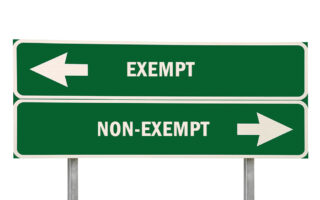Minnesota’s New Legislation Brings Significant Changes to the Employment Law World
By Kevin M. Mosher • Jun 2, 2023
By now you may have heard about some, if not all, of the sweeping changes coming to the employment law world in Minnesota, most of which are set to take effect next month. But one thing is certain, whether you have one single employee or hundreds or thousands of employees, the changes are sure to impact your business in some way.
During our next webinar, we will review all the new Minnesota laws that will impact your businesses in greater depth on Minnesota Changes the HR World – What to Know and Why Employers Outside MN Need to Be Paying Attention!
In the meantime, a teaser and brief (ish) overview of the topics we’ll cover on the webinar:
Mandatory Paid Sick and Safe Leave
Minnesota is joining the growing list of states to require paid sick and safe leave for all employees. Yes, even businesses with one employee! All Minnesota employees (full-time, part-time, and temporary workers) will accrue at least one (1) hour of sick and safe leave for every 30 hours worked, up to 48 hours per year, and are entitled to carry over unused accrued time from year to year, up to 80 hours. Alternatively, you can just give your employees 80 hours on the front end annually to utilize throughout the year if that’s easier from a logistics standpoint.
Fortunately, you have a bit more time to figure this one out, as the new mandatory paid sick and safe leave doesn’t go into effect until January 1, 2024.
Please Note:
You are also required to provide employees with notice of their rights to earn sick and safe time, and it must be included in your employee handbook! (If you need a review of your current handbook policies to make sure they comply with the new requirements, I’m happy to take a look!)
Expansion of Nursing Mothers, Lactating Employees, and Pregnancy Accommodations Employee Protections
Every employer is most likely going to need to make some key changes to any existing pregnancy accommodation, pregnancy leave, or breastfeeding policies. The largest impact of this policy change will undoubtedly be felt by small businesses that previously fell below the current 21-employee minimum.
Breastfeeding:
Your breastfeeding policy can no longer specify a timeframe after a child is born in which employees are protected, and are no longer allowed to include an exception to deny a break for any disruption to your business operations, effectively removing any control from you or your company.
Pregnancy:
Employees are no longer required to work for an employer for at least 12 months before qualifying for Minnesota Parenting Leave! Yes, you heard that right. That means basically everyone qualifies. Not only that, but to qualify for parenting accommodation and/or leave requirements, you now only have to have 1 or more employees, as opposed to 21 or more before.
Please Note:
You are also required to provide employees with notice of their rights under this law, and similar notice in your employee handbook. Make sure you are reviewing your policies before the end of the month!
A Near Complete Ban on Non-Compete Agreements in Minnesota
Minnesota is the fourth state to pass a law prohibiting non-compete agreements. The prohibition essentially bans any and all non-compete agreements, subject to a few narrow exceptions (in connection with the sale or dissolution of a business.) Interestingly, the law only applies to non-compete provisions for agreements entered into after July 1, 2023. Current non-competes are not impacted by the law.
Please Note:
This ban does not apply to non-disclosure, confidentiality, trade secret, or non-solicitation agreements — strictly non-competes.
Other significant changes coming to Minnesota employment laws outside of SF 3035 that everyone should be aware of
You are now (mostly) prohibited from inquiring into a job applicant’s pay history.
- S.F. 1885 amends the Minnesota Human Rights Act by prohibiting employers from inquiring into an applicant’s pay history to determine their compensation.
- It establishes a rebuttable presumption that the use of pay history to determine compensation is an unfair discriminatory employment practice.
- It does not apply if the applicant’s pay history is publicly available unless sought with the intent of obtaining a pay history to determine compensation.
- It does not prevent applicants from voluntarily disclosing their pay history.
With the legalization of recreational marijuana use in Minnesota, you are going to want to revisit your company’s drug and alcohol-related policies, specifically when it comes to drug testing.
- Testing job applicants for cannabis is now prohibited unless the employee is in a “safety-sensitive position.”
- You can still require current employees to undergo testing if there is ‘reasonable suspicion” that the employee has used cannabis or is otherwise under the influence of cannabis while working.
- The best way to protect your company is by outlining a comprehensive drug, alcohol, and cannabis testing policy, along with established processes and procedures, applied consistently with each reasonable suspicion case.
Minnesota’s New Paid Family and Medical Leave program benefits will begin on January 1, 2026.
- This is entirely different from the paid sick and safe leave going into effect in January, so please don’t confuse the two!
- PFML premiums will be 0.7% of an employee’s taxable wages to start, but you can only charge your employee a max of 0.35%. Meaning, you guessed it, you get to cover the rest!
- Pretty much every Minnesota employee will become eligible to take 12 weeks of paid leave within a single year after they have earned more than about $3,500 in wages within the state over a period of a year. Much more to come on this one!
Wow, lots of changes coming, right? Excited to learn more about how you or your business might be impacted by the new laws? Join me for my monthly webinar on Thursday, June 8th at noon (CST).
Click here to register now!
Thompson Coe and myHRgenius Tip of the Week is not intended as a solicitation, does not constitute legal advice, and does not establish an attorney-client relationship.










